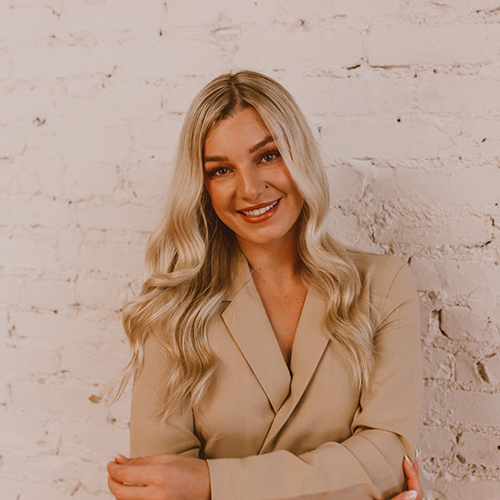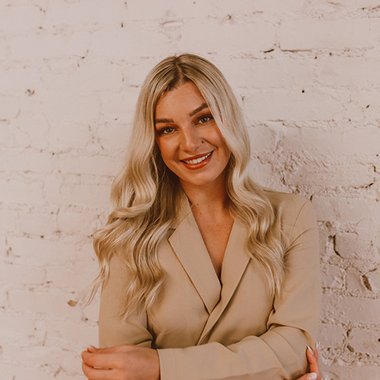Paysafe recently sponsored a virtual pitch competition hosted by Entreprenista, which turned out to be an immensely successful event. The competition featured nine businesswomen, who presented their innovative business ideas in front of a panel of experienced business owners and investors with the hopes of winning Paysafe’s $5000 prize. The event brought together more than 140 members and fans of Entreprenista, who joined virtually to support and encourage the pitching entrepreneurs. The presentations were incredible, and competition judges offered invaluable feedback and insights to the contestants, helping them fine-tune their business plans further. We had the privilege of chatting with the winner of the competition, Dr. Najwa Javed, CEO of E’MAR Italy, who shares her insights and experience as an entrepreneur below.
Like most children of immigrants, Dr. Najwa came from humble beginnings. She grew up moving throughout the United States, but calls Tulsa, OK her home, which is where she spent her formative years. Growing up, her parents always encouraged her to work for her money and she began with babysitting jobs, outsourcing her brothers to mow lawns, and in college, she paid her way through by providing salon services in the dorms.
“I guess I always had an entrepreneurial spirit but I didn’t know it was called that; I thought it was plain immigrant hustling.”
However, her parents were very strict about focusing on education and not just money so she earned a Bachelor’s degree in Biochemistry/PreMed and a Minor in Ethnocultural Anthropology, and a Master’s in Clinical Research and Biostatistics at the University of North Texas Sciences Center. Then, she moved to the Bay Area to study at the California School of Podiatric Medicine and graduated with a Doctor of Podiatric Medicine, DPM. Her residency training took place at VA Palo Alto and Stanford Hospital, with an emphasis on diabetic foot care, limb salvage, and reconstructive foot and ankle surgery.
Today, Dr. Najwa is a full-time Board-Certified Podiatrist, practicing in the heart of Silicon Valley. She is the CEO of Silicon Valley Podiatry Group, a robust and comprehensive medical group providing cutting-edge medical therapies.
“During my private practice years, my patients ranged from VCs, CEOs, profiled celebrities, nurses, store clerks, fellow doctors, and socially active mommies; all of whom were looking for stylish yet sensible shoes. I never thought of becoming an entrepreneur but life is interesting and sometimes things happen serendipitously. Therefore, the genesis of E’MAR is so special. For me, it’s a time of growth that is parallel to my own personal and professional growth.”
Dr. Najwa realized that she had spent the last 15 years evaluating and treating people with foot ailments while simultaneously teaching them how to buy the best shoes for their foot type. It became apparent that it was her life’s calling to create a footwear line that would provide the epitome of foot support without compromising style.
The concept of E'MAR came to fruition during a girls' weekend trip in May 2017, where Najwa's friends complained about their feet and suggested that she should create a high heel. Although Dr. Najwa didn't have a background in fashion or footwear design, she decided to bring her knowledge to the world. Dr. Najwa took the time to curate creative design and advisory teams, and together, with her medical background, they went to work building shoes that could provide foot support without compromising style. With her knowledge and expertise in foot ailments, she founded E'MAR Italy, a shoe brand built with wellness in mind.
From struggles with VC funding to the inevitable changes a pandemic brings to the world and industries, the creation of E’MAR Italy did not come without its challenges. Despite the challenges and obstacles she faced in the early days of her business, she pivoted her strategy and focused on building the company organically. With the support of her advisory board, legal and accounting teams, and her commitment to E’MAR Italy’s mission, Najwa has created a shoe brand that provides comfort and quality. Her story is a testament to the power of perseverance, determination, and innovation in entrepreneurship.
Read the full interview below:
- Q: What inspired you to become an entrepreneur?
A: Honestly, I never even knew what an entrepreneur was, I thought that the word was reserved for people like Bill Gates or Sandy Lerner. Entrepreneurship was a thing of the privileged and ones with pedigrees. I had neither. Yet, what I did have was ambition. I always thought of myself as a hustler, working harder and smarter on the daily. Yet, when I look back at my younger self, I realize that every single trait that makes you an entrepreneur was already seeded inside of me. I could identify a problem and develop a solution, regardless of how simple or difficult it may be. I had GRIT and that’s all one needed. Even today, it takes me a minute to truly get comfortable with the word ‘entrepreneur’ but what I know now is that I have equity inside of me and that counts for everything.
- Q: Why do you think entrepreneurship is important in today's world?
A: Entrepreneurship in today's world is critical because it seeds innovation and creativity. It allows you to think outside the box and change the status quo. For me, it is isolating a problem and solving it for a better world; where we all benefit. It’s not about money or fame- most entrepreneurs will tell you that building something from nothing is so grueling and most do not see rewards for long periods. Yet it's the passion for changing the paradigm that keeps them going. Entrepreneurship is not for the faint of heart. It takes a lot out of you. There are days when you feel so low that only having that vision of bringing about change is what uplifts you. Yet when you finally can see your idea flourish and make change, there is no greater feeling. Entrepreneurship is also so critical for our children to know that their ideas and creativity are loved and respected. That their hard work is noted and embraced.
- Q: Why did you join Entreprenista?
A: As a solopreneur, the journey can be lonely. You can have a team of people working for you but as a CEO it's hard to display any type of vulnerabilities. Joining Entreprenista gave me the chance to voice and share my fears and hopes in a safe environment; knowing everyone was going through or had been through the same issues at some point. I was an avid listener to the podcast (2 years) before I joined the league. I didn’t think I was at the same level as these amazing women and it wasn’t until I joined that my imposter syndrome left me.
- Q: Why did you decide to start E’MAR Italy?
A: The creation of E’MAR was completely serendipitous. As a shoe lover, it had never occurred to me that I, as a foot and ankle surgeon, could create a line of heels. It was not in my job description yet there could be no one better than me. I had spent the last 15 years of my life evaluating and treating people with foot ailments while simultaneously teaching them how to buy the best shoes for their foot type. It became apparent that it was my life’s calling to create a footwear line that would provide the epitome of foot support without compromising style.
On one girls weekend trip in May of 2017, the concept of E’MAR came to fruition. My friends were complaining about their feet and I was advising them when one said, “Najwa, why can’t you make a high heel?” I laughed and said, “ I am a physician, not a shoemaker.” They, however, were convinced that I had to bring my knowledge to the world. During my journey, I was able to meet wonderful people who would introduce me to my creative design and advisory teams. I did not have a background in fashion or footwear design, so learning from the experts was key. Then, I had to prove to them that they had it all wrong.
- Q: What were some of the biggest challenges or obstacles you faced in the early days of your business, and how did you overcome them?
A: Every entrepreneur is going to make mistakes and that’s just the name of the game. These are important growth potentials. However, one mistake that I made early on was trying to get VC funding.
Call this naiveté or just plain ignorance. I am not sure, but I always thought that it was like an equation. Founder-product + product-market fit = VC money. Well, that is not how it goes. VCs are looking for an exponential growth curve and if you don’t fit that model they will likely overlook you. No amount of hard work, dedication, or GRIT changes their mind. I get it, it’s a business after all. However, I was always told that for me to launch a startup and scale it – I would need VC funding. I had some dark days when I would be told “NO” over and over again. Most days felt like they were saying “NO” to everything you stood for. It was hard to digest. I was told that I had to leave my job as a physician, but I thought, “How would I fund E’MAR if I didn’t work?” There were so many contraindications in the funding world.
Finally, I had to just stop going down that rabbit hole. I told myself that I would do what I believed would be best for the brand and my vision for it. Once I came to this realization, I stopped letting people tell me what was best for my brand and started to seek out people who believed in me and my vision. I started to focus on building the company and scaling it organically. We launched on January 2020 and then COVID happened. After years of research and development, this was supposed to be the year! The pre-sale order was supposed to be delivered in March of 2020 coming from our factory in Italy. In January of 2020, Italy was hard hit by the coronavirus and everything came to an abrupt stop. By March of 2020, we didn’t even know if the factory, its suppliers, or E’MAR was going to survive. Unlike other shoe brands, the medical technology built inside the shoes had taken years to perfect in Italy. There was no way to transfer it to another manufacturer at this stage. We were in a deadlock.
Everyone around the world lay shocked as one by one the world and its industries came to a halt. Honestly, I was unsure of what to do but it is unlike me to panic, so I didn’t. Maybe, it is because I am a surgeon and work well under pressure or that I am continuously updated on what’s happening on the front lines. I had to think quickly on my feet, literally. After the initial shock, I just pivoted the whole 2020 game plan. It also helped that the whole world was in the same boat as me. So, the short answer is that the marketing did not go as we planned. The demographic that E’MAR targeted, professional and socially active women, were no longer working in the office and the rest were reverting to loungewear. However, as I pivoted our strategy it occurred to me that once people do go back to their normal life they will never want to wear anything uncomfortable again. That gave E’MAR an advantage because the line is built with wellness in mind. Furthermore, there is now a whole movement to increase sustainability. Gone are those days, when so many of us would buy cheap shoes on sale just to throw them away as quickly as we bought them; all because they HURT. With E’MAR, you can rest assured that your feet will be anatomically supported in quality materials and design, alleviating the need for high turnover on your staple pieces.
- Q: How did you go about building your team and developing your leadership skills?
A: Prior to launching E’MAR, I knew that I would have to partner with experts in their field to learn the ropes. I had no idea how a shoe was built, why we couldn’t combine comfort with high heels, and why did the current market stakeholders not care about painful heels. I quickly learned it was because there was a lack of innovation and support. It took me two years to learn about the industry. I had meetings with anybody who would take a call with me. I traveled to London, Italy, and Hong Kong to learn about manufacturing. Once I got a good foundation I was able to bring on experts in their fields to help build out E’MAR. I hired a creative team to design the shoes around my medical technology. I brought an advisor to help me build the focal team members. Over the last 5 years, I have spent time working with Founders, CEOs, Investors, and VCs to really hone in on how to be a good thought leader and executive. I treat my team with the utmost respect but also have high expectations and standards that have to be met. I don’t believe in micromanaging but I do believe in collaborative work. My team works in a circle and not a pyramid. We are all focused on the success of E’MAR and the customer experience which is what makes us a great company.
- Q: Did you have any outside help? If so, what kind of support did you receive?
A: Yes, I had an advisory board, legal, and accounting help. You have to get the right people on your team so that you can effectively launch a company. Otherwise, there are too many issues that can arise which can cause your company to fail.
- Q: How did you approach product development and innovation within your business?
A: In a quest to find a solution for painful heels, I began by researching athletic shoes and becoming an expert of sorts on the category, advising my patients on which pairs offered the best support for their foot type. Soon, my patients were asking me for luxury shoe recommendations.
I noted that if anything, the silhouettes appeared to be getting steeper and more uncomfortable. There was also an increase in shared thoughts by other surgeons-turned-shoe-designers, including orthopedic surgeon Taryn Rose, who released her own collection of luxury heels beginning in the ‘90s, and podiatric surgeons Joan Oloff and Marion Parke, who debuted their high-end footwear offerings in 2013 and 2015.
Instead of creating new shoe styles to start, I decided to use my experience building insoles to create a custom inlay design that could offer support inside high heels. This insole would have to be ultra-thin and built on a high-performance material to move away from bulky foams. This initial plan ended up leading to two roadblocks.
While each handmade inlay was sized to patients’ feet, I realized that they wouldn’t conform to every heel style — depending on factors like the pitch and length of various toe boxes and heel counters. Not ready to give up on my insole design, I decided to advise footwear companies on how they could craft their footwear offerings to accommodate these orthotics. Many of the brands I encountered, especially designer labels, rejected the idea of putting insoles inside their shoes, saying that female customers were willing to wear them as is, however painful they may be. That is when I decided I was going to make a shoe myself. I worked with a manufacturing company in Italy to design the “last” or solid mold around my orthotic instead of using prefabricated molds. This was a heavy investment but I knew this would be the only way to change the way heels were made.
- Q: Can you share some of the key lessons you've learned from both your successes and failures in entrepreneurship?
A: Keep fluid. Flow to the path of least resistance, ebb when needed, and gush when allowed, but keep flowing. Nothing can stop passion, not even a global pandemic. If you want to succeed, surround yourself with people who believe in your passion and the product. Take all positive and negative criticism into consideration; this will help to hone your product or strategy for the best. Never forget, you learn best from failures and criticism- these give you the opportunity to perfect yourself with each step. Never take NO to heart, it’s better for you to have a naysayer off of your team. Set weekly and monthly goals and hold yourself accountable to those. And always remember to give yourself grace. Life is important to live.
- Q: What advice would you offer to aspiring entrepreneurs?
A: Do your due diligence if you are serious about building a company; you will work harder than you have ever worked before and only passion and ambition greater than yourself will get you there.
And also, as a physician I have to add:
- Get a good night’s sleep, it is critical for your health.
- Wake up each morning with a clear mind. Take a moment to center yourself as you awake.
- Exercise your body and mind. Walk, run, stretch, swim, and make task lists to keep it all on track. You cannot live a productive life if your body and mind are not optimized.
Learn more about the event and other participants here:
- Pinkey Patel – Myri Health
- Punya Shah and Claire Steinberg – EventAve
- Sarah Kugelman – Golden
- Michelle Larivee – wthn
- Jaclyn Tracy – Sistain
- Lindsay Simon and Delia Hughes – Tazzy
- Diana Arango – Chefpost
- Meredith Evans McAllister – Marma Nutrition




